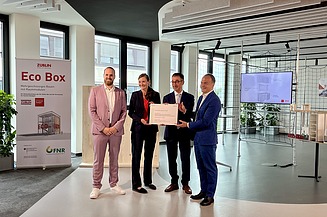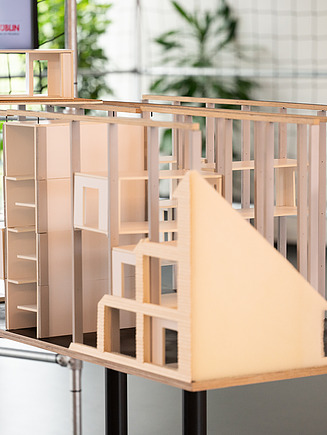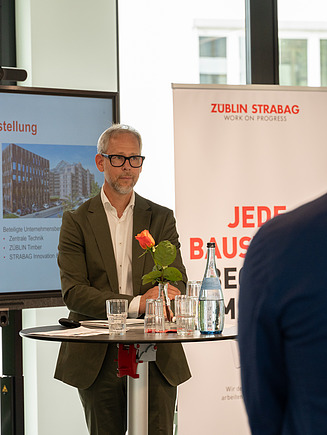Federal Ministry of Agriculture promotes "Eco-Box" modular timber construction system

- ZÜBLIN is developing the "Eco-Box" timber construction system together with the Stuttgart University of Applied Sciences
- Buildings are to be constructed particularly systematically and efficiently from prefabricated residential modules
- The funding from the Federal Ministry of Agriculture supports the further development of the project to market maturity
The Federal Ministry of Agriculture is funding the "Eco-Box" timber construction system project set up by ZÜBLIN and the Stuttgart University of Applied Sciences with a total of 718,000 euros. The funding is part of the "Renewable Resources" program. The aim of the "Eco-Box" project is the market-ready development of a modular room system for multi-storey buildings. It should allow architectural diversity and variability, taking into account the location factors and the building's internal structure. Sustainability aspects in the use of materials and in the construction process are also taken into account.
The project, based on the renewable raw material wood, contributes to the German government's climate protection plan and the "Energy Efficiency Strategy for Buildings", which aims to make the building stock almost climate-neutral by 2050.
"There is a huge demand for affordable housing throughout Germany, while at the same time we need to build more sustainably and in a more climate-friendly way. There is enormous potential in modular timber construction, which can be used to build attractive homes quickly and inexpensively. This is also active climate protection, as timber construction saves up to 50 percent of greenhouse gas emissions compared to other forms of construction. At the same time, our rural areas in particular benefit economically, as timber module production creates added value and good jobs here - from the forestry and timber industry to trade and industry. We need innovative projects like Eco-Box, which combine sustainability and economic efficiency in such an outstanding way," emphasized Federal Minister Cem Özdemir during the presentation of the funding decision.
Sustainable innovation through primary and secondary supporting structure
Building with prefabricated elements is often referred to as modular construction, because prefabrication in the construction industry has so far mainly involved individual components such as ceilings, columns or walls in shell construction. In timber construction, too, prefabricated ceiling or wall elements are often referred to as modules. However, entire room modules can also be produced as prefabricated rooms in the factory and transported to the construction site. As part of the "Eco-Box" project, building with timber hybrid room modules is being implemented.
The innovation of the "Eco-Box" based on the modular principle is the separation of the modular system into a primary and a secondary supporting structure. The primary structure is a reinforced concrete frame, while the secondary structure consists of the so-called "Eco-Boxes". These are not stacked on top of each other, but are pushed into a braced shelving system like drawers. In the future, the boxes can be used individually for small apartments or combined for larger residential or office units.
"It is precisely these innovations that we need in order to master the central challenges of our world against the backdrop of the megatrends up to 2050. Firstly: we (i.e. our world) are getting hotter; secondly: there are more of us (approx. 10 billion people); thirdly: we (i.e. 70 percent of the world's population) live in cities. Stuttgart University of Applied Sciences is proud to be working with ZÜBLIN to develop solutions to these challenges and implement them for the benefit of the world," says Prof. Dr. Katja Rade, Rector of Stuttgart University of Applied Sciences.
More speed and sustainability in residential construction
"Due to the construction industry's major influence on global energy and resource consumption, it is essential to align our actions with the sustainability strategy when planning, constructing, renovating and operating buildings. The development of innovations based on sustainable raw materials is therefore a particularly high priority for us," says ZÜBLIN board member Markus Landgraf. "In view of the high CO2 emissions in the production of cement and increasingly scarce resources such as sand, the proportion of renewable raw materials such as wood as a building material is growing steadily. In addition to the claim to give more weight to sustainability, the project can bring more speed to residential construction," adds Dr. Marco Xaver Bornschlegl, Head of STRABAG Innovation & Digitalization. The persistently high demand for affordable housing requires innovative and efficient solutions.
Modular construction is one way of creating affordable and attractive living space. Sustainable buildings must not only be designed, implemented and operated in an environmentally friendly and resource-saving manner, but also in an economically efficient way. The key advantage of modular construction lies in the high degree of prefabrication thanks to a shift to stationary production. This leads to considerable time savings in the construction process and reduced noise, vibration and dust pollution, which has a concrete impact on costs, for example for construction site equipment. Another advantage is that the modular construction method can be applied to several projects on different construction sites.
-
 © ZÜBLIN
© ZÜBLIN -
 © ZÜBLIN
© ZÜBLIN